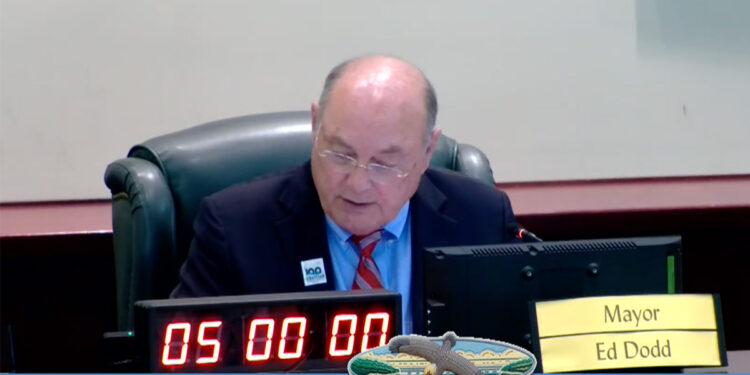The Sebastian City Council voted 5-0 to join a class action lawsuit against the state of Florida, declaring Form 6 unconstitutional and a violation of their privacy at the February 14, 2024, city council meeting.
The city will incur a $10,000 expense to participate in the lawsuit alongside the law firm Weiss Serota Helfman Cole + Bierman, P.L. Jamie A. Cole will handle the city’s representation. This class action lawsuit already has 25 cities, which include 66 council members and two individuals locked in.
“I think it’s about time we start suing the state for some of the stuff they throw down at us,” Council Member Bob McPartlan stated during the meeting.
Unlike Form 1, which was formally required, Form 6 mandates that municipally elected officials publicly disclose comprehensive personal and business financial details. This legislation went into effect on January 1, 2024. Since then, more than 113 Florida elected officials have resigned to avoid new disclosure requirements.
Who is required to complete a Form 6 in Florida?
Before January 2024, the requirement applied to all elected state and county officials, comprising the governor, lieutenant governor, members of the governor’s cabinet, Florida Legislature members, state attorneys, public defenders, judges, circuit court clerks, tax collectors, property appraisers, elections supervisors, county commissioners, elected school superintendents, district school board members, and various local positions and authorities.
Starting January 2024, this list has been extended to include mayors, elected members of municipal governing bodies, and members of the Commission on Ethics.
Which financial details are required for inclusion on Form 6 by Florida politicians?
The elected officials must disclose their net worth, encompassing the monetary values of bank accounts, 401(k) plans, and other assets. This encompasses household items, personal belongings, real estate, liquid assets, securities, bonds, certificates of deposit (CDs), business stakes, interests in trusts, outstanding debts, and investments across different accounts, including the Florida College Investment Plan.
Moreover, they must declare any income sources surpassing $1,000 in the previous calendar year, as well as liabilities exceeding $1,000, including the details of each creditor’s name and address. Previously, they were only obligated to disclose their income sources and business interests without specifying precise amounts or proportions.
Failure to submit can lead to removal or suspension from public office or employment, accompanied by an automatic fine of $25 per day for lateness, up to a maximum penalty of $1,500.
Failure to comply with mandated disclosures may result in the following repercussions:
- Reprimand
- Demotion
- Salary reduction
- Impeachment
- Civil penalties of up to $20,000
The mandate is widely viewed as an unforeseen breach of privacy and unjustified government intervention, catching many off guard who had not anticipated such requirements when running for office. Moreover, there are apprehensions regarding the unexpected financial burden of hiring a Certified Public Accountant (CPA) to navigate the intricacies of the form, which can be complex. These concerns are compounded by the possibility of penalties for oversights or mistakes, particularly since city council roles often offer minimal or no financial remuneration.








